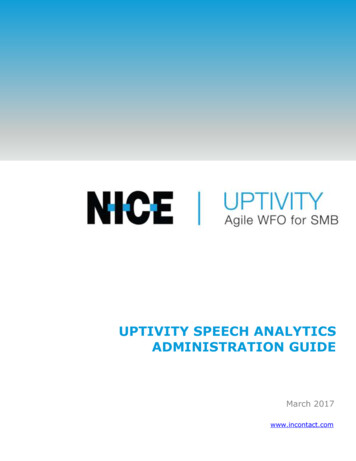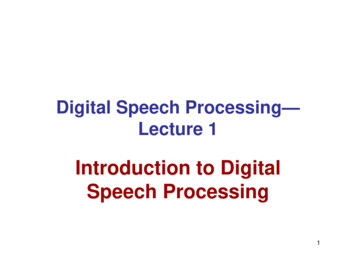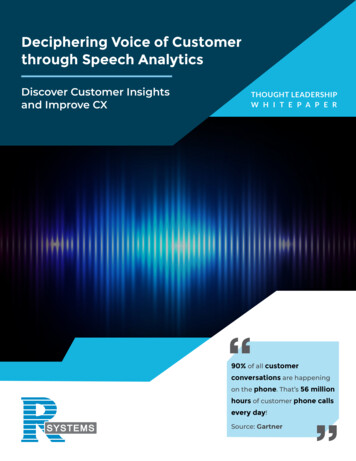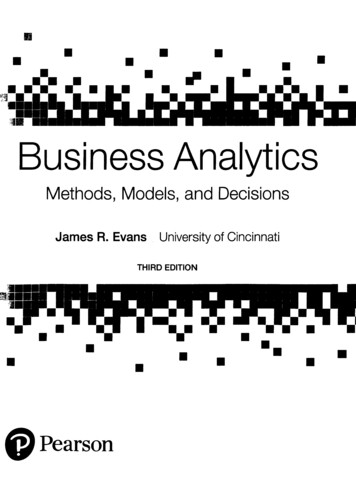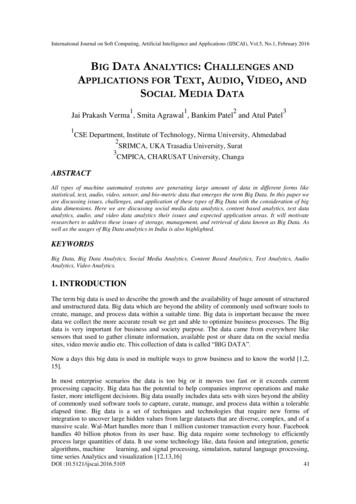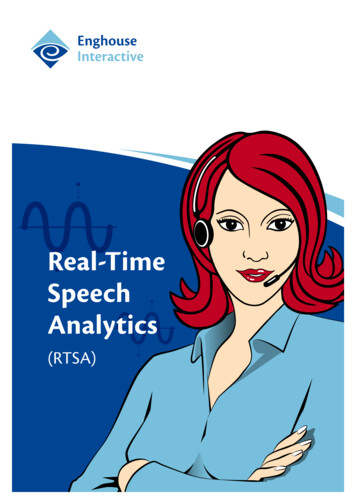
Transcription
Real-TimeSpeechAnalytics(RTSA)
Real-TimeSpeechAnalyticsEnghouse Interactive’s Real-Time SpeechAnalytics (RTSA) is the first innovativesoftware offering with fully automatedquality assurance and call optimisation.Real-Time Speech Analytics analyses agent and customerspeech to provide live feedback to agents and teamleaders about what is being said, and how it’s been said.It monitors stress levels, speech clarity and scriptadherence, all whilst the call is in progress.In parallel, RTSA searches for phrases, keywords anddialog pairs in calls, to find certain predefinedrequirements. During this process, RTSA evaluates the“agent” and “customer” speech channels using themarket-leading speech recognition software fromNuance. RTSA is intuitive and easy to use, requiring noprogramming or phonetic knowledge for configuration.RTSA evaluates the quality of all calls in an automatedand 100% objective way. This leads not only to timesavings and a higher efficiency of quality management,but also allows for resources such as agents and serviceteam members to be planned very specifically.The user is guided in a simple and self-explanatorymanner, making it possible to define quickly whichcharacteristics are to be checked. Clear, graphicalevaluations of the characteristics at the level of the call,agent, team or campaign round off the software.
Advantages at a glanceLEGAL CERTAINTY100% certainty/assurance that contracts areconcluded correctly by telephoneEssential statements made during a call arechecked and documentedVerifies that agents adhere to customerspecific requirementsQUALITY ASSURANCELive featureThe RTSA “live feature” can provide practicalhelp especially to the agents in their day-today routine.For example, it can monitor and improveconversations in real-time by checking to seewhether pre-defined phrases and keywordswere said during the call.Real-Time Speech Analytics informs the agentimmediately and without delay on the screenabout a mistake made. This allows the agent tocorrect it during the call. In addition, thecompany benefits from increased efficiency andquality due to a reduction in follow up calls.Furthermore, real-time monitoring provides animportant contribution to increasing legalcertainty with respect to customercommunications.A final score evaluates the call in the overallcontext of the campaign.Conversation quality of entire campaignscan be evaluated objectively at the push ofa buttonConsistent evaluation criteria provideclear resultsCustomers are ensured transparencyAgents continuously improve thanks totailor-made training programsFirst-class conversations, increase customersatisfaction, loyalty and retentionEFFICIENCYAnalysis and evaluation of conversationssaves time and increases efficiencyTailor-made coaching for individual agentrequirementsSales order cancelation quota can be reducedTrainers can be used more efficiently due toefficient checking of the callsINVESTMENT SECURITYRTSA is multilingual and international: mostmajor European languagesModular software with open interfaceAnalytical results can be output in standardformats (such as MS SQL Server and CSV)
R E A L-T I M E S P E E C H A N A LY T I C SConfigurator, Analyser,Live ClientReal-Time Speech Analytics consists of four componentswith the evaluators being the main components for callevaluation. Use the RTSA Configurator to set qualitycriteria (eight evaluators available) and to define thecharacteristics that are to be checked in the campaign,in a simple, quick and independent manner.RTSA Analyzer can provide clear, graphical evaluation ofthe quality criteria at call, agent, team or campaign level.The real-time analysis of phone calls immediately alertsthe agent if relevant information has not been providedor has been provided incorrectly. This gives the agentthe opportunity to make corrections before the callis over.The integrated role management functionality enablesthe system to provide user-specific analyses. This allowsagents to view their own statistics, while coaches andteam leaders see the results in an overall context.4EVALUATORS AND THEIR FUNCTIONS IN DAYTO-DAY OPERATIONSTo ensure an objective call evaluation, the evaluatortypes are divided into two categories: hard evaluatorswhich are largely based on speech recognition – “whatis being said” and soft evaluators which assess the softerspeech factors – “how it is being said”.All soft evaluators can be operated in two differentmodes, ‘raw’ and ‘rated’. The ‘raw’ mode providesa calculated measurement based on quantity. Thevolume, for example, is indicated as high or low. Thismode allows professional trainers to draw conclusionsfrom the raw data. The ‘rated’ mode provides anassessment. For example, the volume is rated as either“good” or “bad”. This can be configured based on whatis considered “good” or “bad”.
EvaluationREQUIRED PHRASESRTSA can determine if predefined phrases and keywords were correctlymentioned during a call. Keywords mark the most important part of aphrase. It can decipher if important phrases were mentioned at all, even ifthey were worded differently. By specifying Required Phrases, especially whencontracts are being concluded or financial transactions are being conducted,means compliance requirements are met. Verification of the agent‘s adherence to the script Automated verification whether all relevant phrases have beenmentioned Verification of the correct greeting, good-bye etc. Verification of customer identification (Did the agent ask for name,address, birthdate etc.?)DIALOG PAIRSDialog pairs consist of a phrase (e.g. “Are you over 18?”) and a predefinedanswer (e.g. “yes”/“no”). Generally, these are question-answer pairs. This featurechecks the agent and customer channels of the recorded call one after theother for the specified phrases. RTSA also defines a time frame in which theanswer to the question must be given. Furthermore, Dialog Pairs also ensuresconformity with the law when customers are required to opt in or opt out. General verification of customer agreement Verification of confirmation to record Verification of the acceptance of the contract and its terms Verification of opt-in for future communicationENGHOUSE INTER ACTIVE5
R E A L-T I M E S P E E C H A N A LY T I C SEvaluationGOOD PHRASES & BAD PHRASESCATEGORYBy defining “good” and “bad” phrases, you can determinehow many desired or undesired expressions youragents are using. This is especially useful when there isa specified “brand language” which agents are requiredto use or when receiving customer complaints. RTSArecords the number of used ‘good’ and ‘bad’ phrases andusing a statistical algorithm calculates a score for the call.This evaluator automatically categorises calls based onthe occurrence and proximity of predefined keywordsand phrases. It may also be used as “next-best-offer”evaluator for automatically showing hints to agents inspecific situations. Automatic categorisation of calls using predefinedphrases and keywords Displays hints for next best offering when a specificcategory is detectedGOOD PHRASES EVALUATOR Count how add-ons have been sold per product Verification whether desired/promotional phraseshave been used Visual positive feedback when correct brand namesare used to introduce new products and services Correlation of promotional phrases and sales ratesBAD PHRASES EVALUATOR Checks whether agents give wrong information(incorrect prices, product names, etc.) Verifies whether undesired phrases have been used Correlation between bad phrases and sales rates Flags up wrong phrases in real-time to the agentCLEAR SPEAKINGRTSA is able to assess if the agent is speakingcomprehensively by evaluating both the pronunciationof the phrases to be checked and the rate of speech.The agent-specific statistics that are based on theseevaluations are ideally suited for use in training and forreviewing the effectiveness of coaching.RATE OF SPEECH Pops up warning messages when agent talks toofast Determines average speech tempo for agentsCLARITY OF SPEECH Check dialects, correct pronunciation Check persistent of speech clarity of outsourcedcentres?6
VOLUME EVALUATORThis is used to evaluate the volumeof the agent and/or customer.This feature distinguishes betweentimes when there is talking andwhen there is no talking (and onlybackground noise can be heard)and whether the talking is too loudor too low. Based on this, generalinformation is displayed regardingthe recording volume of the calland the positioning of the headsetmicrophones. If the customerperceives the agent as “too loud”or “too low”, the agent can seethis immediately and adjust themicrophone position of the headsetaccordingly.ENGHOUSE INTER ACTIVE7
R E A L-T I M E S P E E C H A N A LY T I C SEvaluationSPEECH RATIOThis evaluates the speech ratio of the agent and/orcustomer. You can define a target ratio that will beconsidered “good” (e.g. 80% agent, 20% customer). Themore the ratio in a call deviates from the target ratio,the worse the evaluation score will be. This evaluatoris suited for finding calls where a deviation from thetypical speech ratio was especially noticeable. Thisprovides additional options to trainers to analyse whydifferent behaviours of the agents have different effectson the flow of the conversation.8
CROSS TALKDYNAMIC RANGEThis evaluates whether the agent and/or customerallow each other to finish speaking. If one side doesnot let the other finish speak and interrupts the personinstead, this produces a negative evaluation. The longerand the more often the other person is interrupted,the worse the evaluation score. This evaluation canbe utilised from the customer’s and/or the agent’sperspective (in other words, the system differentiatesbetween who interrupts whom). This evaluator pointsout typical mistakes, such as “getting rid” of a customerby trying to say goodbye while the customer is stilltalking. Furthermore, the feature provides informationabout whether the customer frequently interrupts theagent, which indicates that the customer has alreadyunderstood the topic or is not interested in general.Evaluates the dynamic range of a call. It is analysed,whether the voice can be heard in a natural dynamicrange. “tiny” speech marks at beginning of dull shouldbe as shown here. “dull” speech marks at beginning ofdull should be as shown here. A notice can be displayedon the Live Client to the agent once a configured limitis reached.STRESS LEVELThis evaluates the stress level of the agent and/orcustomer. A high stress level indicates happiness,excitement or annoyance. A particularly low valueindicates calmness, boredom or tiredness. By default, aneutral stress level is considered “good”. The evaluatorenables you to see how agents handle the moods ofthe customers. Additionally, it makes it possible to findparticularly “excited” or “monotonous” conversations.META DATAIncorporate additional data and KPIs into the VocalCoach: any external meta data can be managed andevaluated by the Analyzer, so that you can expand thereports of individual conversations by AHT, successrates and many more. Both the meta-data as well as thedata of the conversation can be analysed in real-timeand be assigned a score between 0 and 100.PAUSEAnalyses and evaluates sentence lengths and breakbehaviour of the agent. That is, if the agent listensactively when the customer speaks or an agent speakscontinuously, making it difficult sometimes to followthem. Regular campaign breaks by multiple agents canalso indicate a poorly designed script.SIGNAL QUALITYMeasures and evaluates the quality of the audio signalof customer and agent in real-time. It notifies, if thesignal is noisy, jittered or clipped.ENGHOUSE INTER ACTIVE9
Enghouse InteractiveHosting PlatformThe Enghouse Interactive Outbound Communicator onDemand,offers market-leading communication solutions on demand via its ownonDemand platform. We operate our own servers at several sites. TheOutbound Communicator Communications Manager, PowerContactand Voice & Data Recorder can be preconfigured to meet yourdemands. Setup usually takes place within 72 hours. Usage can beinvoiced by the minute or as a flat monthly rate plus call charges whichare billed by second.
Enghouse Interactive (UK) LimitedImperiumImperial WayReading, RG2 0TDUnited Kingdomt: 44 (0)2033 573040f: 44 (0)2033 573041e: co.uk
Real-Time Speech Analytics analyses agent and customer speech to provide live feedback to agents and team leaders about what is being said, and how it's been said. It monitors stress levels, speech clarity and script adherence, all whilst the call is in progress. In parallel, RTSA searches for phrases, keywords and
